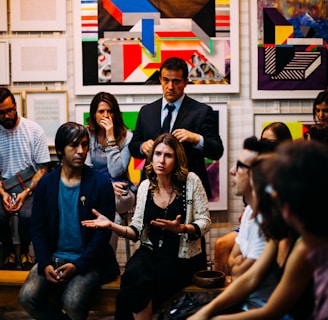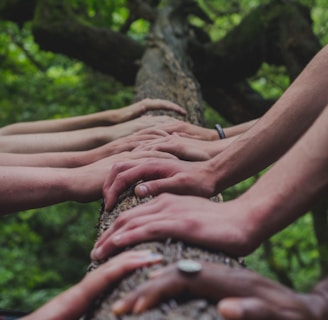Managing Everyday Stressors:
Learn effective techniques to handle daily stress, improve coping mechanisms, and enhance overall wellbeing.
Dealing with Trauma:
Understand trauma and its impacts, along with strategies for recovery and building resilience.
Building Resilience:
Strengthen your ability to cope with adversity through practical exercises and strategies.
Empowerment and Disempowerment:
Explore the dynamics of empowerment and disempowerment in individuals and communities, and learn methods to foster empowerment.
Psychological First Aid and Counseling Techniques:
Gain basic counseling skills and psychological support techniques to assist others in crisis situations.
Creating and Managing Peer Support Networks:
Develop and sustain supportive peer networks that facilitate mutual aid and community building.
Parenting Youth:
Receive guidance and strategies for effective parenting, focusing on communication, understanding, and support.
Leadership and Life Skills for Youth:
Equip young people with essential leadership and life skills to navigate personal and professional challenges.
Unconscious Biases in Diversity and Inclusion:
Identify and address unconscious biases, fostering a more inclusive and diverse environment.
Community Engagement – Process, Strategies, and Tools:
Learn effective methods and strategies for community mobilization and engagement, empowering you to make meaningful changes in your community.




Psychosocial Trainings


Managing Everyday Stressors
We can never avoid stressors in our lives. We can, however, manage them better.
1/2 day to 1-day session
In our sessions, we briefly cover Traumatic Stress which needs to be recognized and managed slightly differently than everyday stressors.
We help you identify what your typical personal indicators are when stress levels get too high in your life. We show how broad the range can be.
We help you identify what has helped you manage your stressors in your life until now.
There is a broad range of healthy coping strategies that we outline and we encourage you to expand your go-to methods for dealing with the impact of the stressors in your life.
We outline negative coping strategies that you may be using in your life, discuss why they can be harmful and how to deal with them.
We talk about identifying the sources of stress in our lives and dealing with them as well.



Dealing with Trauma
Most of us have gone through experiences that were traumatic for us. Sometimes we were able to process and deal with the impact of the trauma. But there are times when we are not able to deal with it and we repress it, so that it continues to impact our lives on many levels, mostly unconsciously.
And then there are those of us who are facing a traumatic situation currently.
Third, there are times when someone close to us is going through a traumatic situation or relationship.
It therefore becomes important to know:
What is Trauma?
What is Post-Traumatic Stress
How do we identify the impact of trauma in our lives?
How do we mitigate the impact of trauma?
What to do if a loved-one is going through trauma?
How to take care of oneself while supporting others?
How to minimize the risk of future trauma in life?
Those involved in caregiving and helping professions are always at risk of vicarious or secondary trauma. In its extreme, this can lead to burnout and even more dire consequences for them. No matter how well-educated they are or how much experience they have, they can always use training and refreshers to build and strengthen their resilience.
The combination that we have found to be the most effective includes one training workshop for each group of up to 25 people, followed by 1-2 individual sessions with each person to create, implement, and modify their individualized Personal Self-Care Plans.
GROUP SESSION: We conduct a one-day (4-hour minimum) workshop on deepening the understanding of the impact of secondary trauma and introduction to techniques and practices that help build resilience. The workshop covers:
· How Secondary Trauma works in our brain
· Impact of Secondary Trauma on various aspects of our lives
· Early recognition of the impact
· Managing the impact
· Preventive Self-care
· Mindfulness and meditational practices
· Introduction to creating and strengthening individualized Personal Self-Care Plans
INDIVIDUAL SESSIONS: While the group session works well to cover the basic information, reflections, and discussion, the fact is that the impact, the coping strategies, and the best-suited preventive strategies vary highly from person to person. For this reason, it is important to facilitate each person in an individualized way to create a Personal Self-Care Plan that caters to the individual’s needs, capabilities, and lifestyle. In our experience, it also helps, at least once, to revisit this Plan after a gap of at least a few weeks, to modify it, making it more realistic and effective.


Resilience-Building and Secondary Trauma
Helping without "Helping"
Empowerment and Disempowerment of Individuals and Communities


In the process of helping individuals and communities, social workers and even huge development programs can disempower those they are trying to help. There are countless examples of this on all levels.
Whether we provide a helping hand to a friend, support someone professionally, or design a community initiative, we need to be mindful of how we impact their empowerment process. This can be very counter-intuitive and therefore requires careful analysis and self-reflection.
We provide different psychological and development models that have been used widely and we show how some help empower and some disempower those they are helping. We also show why it is so attractive for helpers to help in a disempowering way. Ample examples are used from UN initiatives to individual psychological work.
We discuss models and provide practical tips on practices that ensure the empowerment of individuals and communities we support.
Psychological First Aid and Counseling Techniques
Even for those who have been involved in psychological support and counseling activities, it is crucial to have a refresher from time to time on the basics of support and empowerment work. This includes the basics of counseling as well as the basics of Psychological First Aid (PFA).
The details of these sessions depend on the level of activities and objectives of the group we work with. The sessions are therefore designed after a consultative meeting with at least the managers.


Peer Support Networks


Peer Support is essential for the staff of any organization, beyond those involved directly with providing psychosocial support. Work environments where individuals create empathy, acceptance, and authenticity produce healthy, productive, and efficient teams.
Keeping the needs of the organization we work with in mind, we design training strategies to maximize Peer Support within their environment. Essential modules in the training package include:
Reminders and tips to improve communication
Effective giving and taking of feedback
Managing daily and long-term stressors
Dealing with different and difficult personalities
Tips on increasing positivity within and around
Youth has very special development needs and challenges and therefore require a parental style that changes accordingly. Some parents struggle to make these shifts.
We help parents within communities in creating an environment that their kids can flourish in. We also help them deal with their own anxieties and reactions to the often challenging demands of parenting youth.




When children move into adolescence, they face new developmental challenges. With gentle support they can engage better with each other and with their communities in healthy, effective, and meaningful ways.
We facilitate them in:
Being more independent
Taking on more responsibility
Knowing their strengths and challenges
Finding their voice
Connecting with their passions
Creating supportive relationships
Finding enthusiasm for their futures
Building confidence to take initiatives
Engaging with their community

Unconscious Biases in Diversity and Inclusion


... ... ...
Creating an inclusive society, in the true sense, requires us to work on our unconscious biases. And we can only work on our biases if we are able to identify them. We all carry Unconscious biases, but because they are unconscious the first step always is to uncover what our particular individual biases are. Then we need to understand where they came from. Finally we are ready to explore strategies that help us in getting over our particular unconscious biases.
Social Activism
Process, Strategies, and Tools
A few people in a community can get together and initiate changes that can transform life for everyone within that community. That is the power of social activism.
We have been empowering community members to engage and take leadership in:
Identifying their core issues
Making a connection between the issues out there to their personal lives
Bringing about a transformation in their personal lives and their immediate environments
Devising appropriate strategies
Building solidarity with other actors and interest groups
Using activism tools that match their objectives and strategies
Celebrating positive changes they make in their own lives and in their communities




